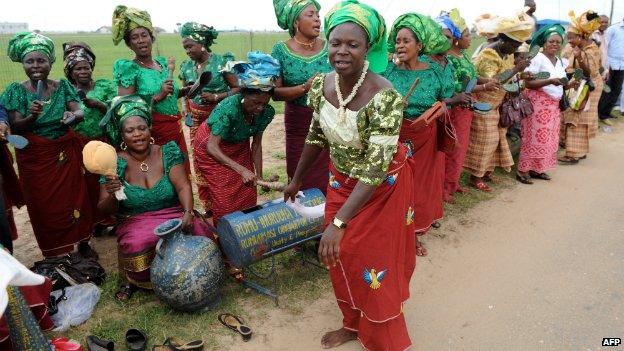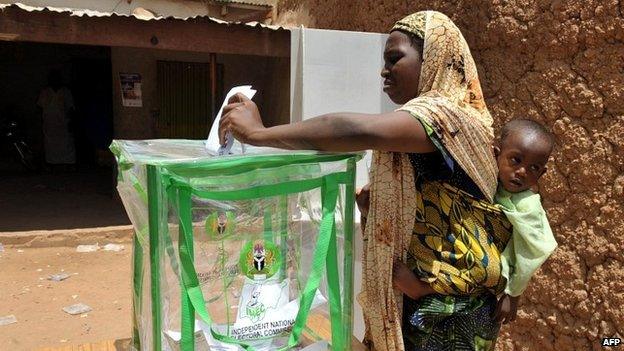Letter from Africa: Sharing Nigeria's cake
- Published
- comments

Nigeria marked 54 years of independence from the UK in October this year
In our series of letters from African journalists, Nigerian writer and novelist Adaobi Tricia Nwaubani looks at the clamour for assistance that accompanies a politician's rise to office.
The political party primaries in Nigeria have drawn to a close and voters now have a clearer picture of whose turn it might be to divide up the national cake after the elections in February 2015.
But the winning candidates won't be the only ones taking their share of the country's riches.
In Nigeria, news of a person's success in an election often travels at the speed of lightning, over rivers and mountains and past fields and forests, to his kindred in all corners of the globe.
Those with no jobs believe their days of unemployment are coming to an end; those with no education think it will soon pose no barrier to climbing the corporate ladder; those in faraway lands begin plans to return home.
Soon, these kith and kin launch their pilgrimage towards the successful candidate.
They ring his phone; they send text messages; they knock at his gate.
They offer to help his campaign in any way they can; they organise prayer sessions for his victory, usually late at night in his living room.
'Bitter tongues will wag'
A friend of mine who lives in Lagos told me last week that he was travelling to Benin city.
His friend had just "picked up" a spot in the House of Assembly there. Another person he knew was set for another top position.
"He's a good friend of my elder brother in Florida," he said. "I've already told my brother: 'You'd better come down and rub minds with him and introduce us to him.'"
Another friend whose husband is a close associate of a winning candidate in one of Nigeria's choicest states told me her phone did not stop ringing after his victory was announced.
People had been calling to offer congratulations. Indeed, even I had called for that very reason.
In Nigeria, the culture has always been that anyone who gets into power, who suddenly finds himself holding a knife with which to cut the national cake, must invite his clan to both slice and eat it with him.

Friends and family of candidates take to the streets to celebrate if their man is triumphant at the polls
The most unforgivable sin a politician can commit is to forget "his people" after he assumes office.
He must "remember" his sisters, brothers, cousins, nieces, nephews, in-laws, friends, schoolmates, and so on.
Preferably through contracts, appointments and jobs.
Failure to do so will lead to taunts and ostracism and on the day his tenure expires, he will find himself completely alone.
Long after his funeral, the bitter tongues will continue wagging.
Local history will forever record him as having denied his kindred their turn.
I have heard several amusing stories regarding the influx of people from the Niger Delta region into Abuja, the Nigerian capital, after their kinsman, Goodluck Jonathan, was elected president in 2011.
Outstretched palms
One of my favourite tales was told by my British-Nigerian friend who teaches in one of those Abuja schools where the children pay stupendous fees in dollars and make fun of their teachers' cheap mobile phones.
She was shocked when a particular pupil, during a science lesson, seemed to know more about crustaceans than you would expect of a child his age in the city.
This child stood before the class and described in great detail how the creatures are caught, cleaned and cooked.

It will be tough for Nigeria to tackle its corruption problem while people demand rewards for their votes
At the end, my friend called the boy aside and asked how he knew so much about the topic.
The child explained that he had grown up in the creeks, where his family petty-traded crustaceans for a living.
That is why the news of a candidate's potential ascension into political office stirs such joy.
In many parts of the world, it requires years of steady progress for one's economic circumstances to radically transform.
Here in Nigeria, all it takes is an election, and a new political appointment. Suddenly, a child goes from capturing crustaceans in the creeks to an exclusive school in Abuja.
Voracious kith and kin are the main force behind Nigeria's corruption problem.
Imagine the thousands lined up with outstretched palms behind each political office holder.
Try telling them that you intend to reform the system now that it is finally their turn to eat.
If you would like to comment on Adaobi Tricia Nwaubani's column, please do so below.